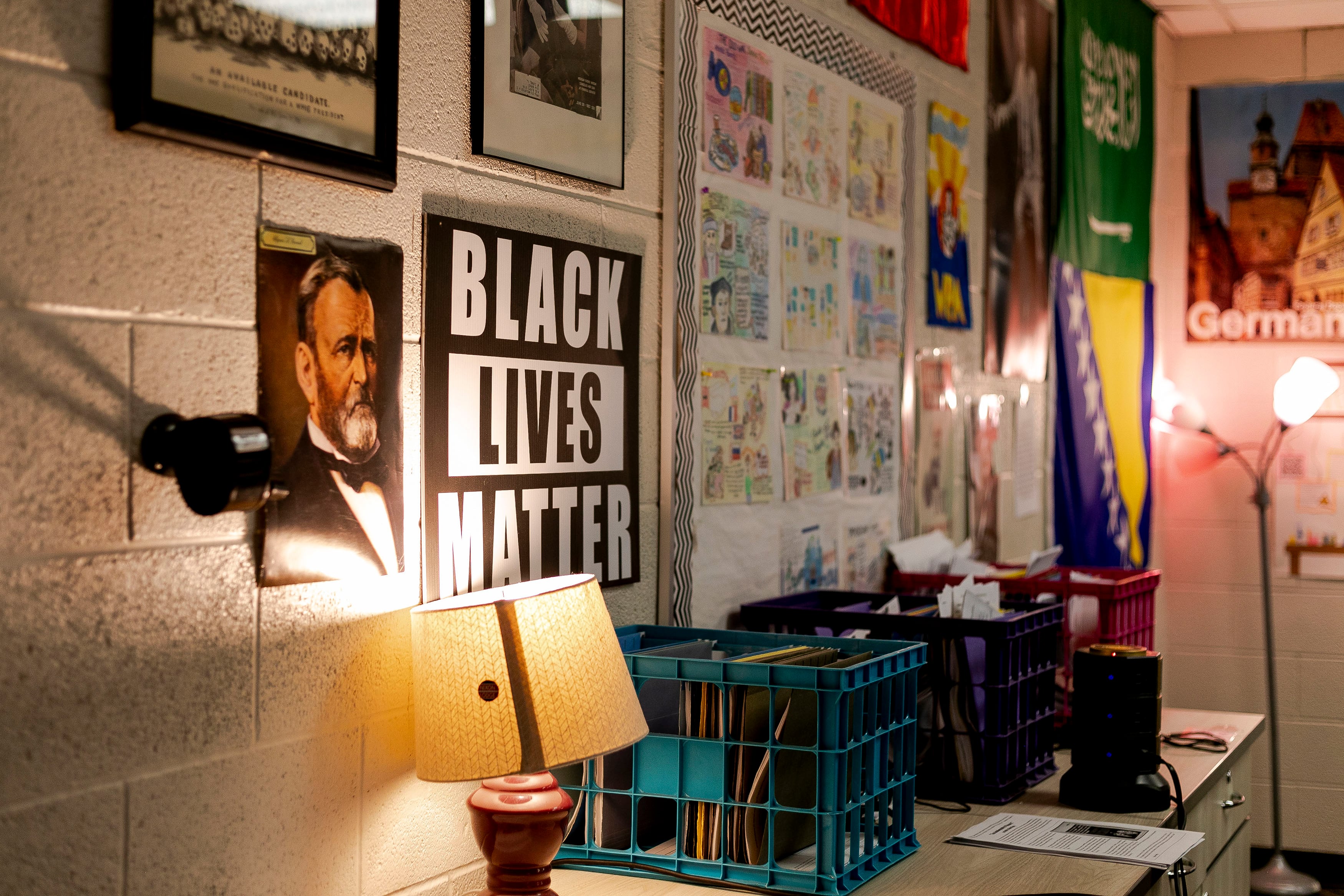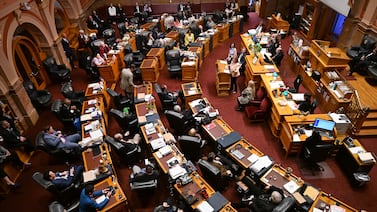Sign up for Chalkbeat’s free weekly newsletter to keep up with how education is changing across the U.S.
Schools that take steps to enroll more students of color in selective programs or to hire a more racially diverse teaching force could face civil rights investigations under the Trump administration — even if they’re using criteria other than race to achieve those goals.
In a Dear Colleague letter intended for school leaders, the U.S. Department of Education’s top acting civil rights official said Friday that discriminatory practices had proliferated in American schools “under the banner of ‘diversity, equity, and inclusion.’”
“But under any banner, discrimination on the basis of race, color, or national origin is, has been, and will continue to be illegal,” wrote Craig Trainor, acting assistant secretary for civil rights in the Education Department.
The letter cites the 2023 Supreme Court decision in Students for Fair Admissions v. Harvard, which found that universities cannot use race as a factor in college admissions. Since that decision, conservative groups have tested its implications for scholarships for prospective teachers of color, programs that provide extra support to students of color, and admissions policies that aim to diversify magnet schools.
But the Supreme Court has not yet revisited the question in one of these other contexts. By not taking up the case, the court even allowed a change in admissions policies at an elite Virginia high school that de-emphasized test scores to remain in place. Asian American parents had alleged the district discriminated against their children in its pursuit of a more diverse student body.
Legal experts said the Dear Colleague letter misstates the law in the aftermath of the Students for Fair Admissions case and represents an “enormous leap” in telling school districts and universities they can’t use non-racial criteria in pursuit of diversity goals.
The admissions case does create a higher bar for taking race into consideration, said Derek Black, a University of South Carolina law professor. Schools may need to rethink programs that appear to benefit one group to the exclusion of others, as Los Angeles Unified School District did when it overhauled its Black student success program in response to a legal challenge.
But for nearly two decades school districts have believed they are in a legal “safe harbor” when they use non-racial criteria such as household income and ZIP code to diversify their schools, Black said.
“This letter is saying, ‘You don’t even have safe harbor anymore,’” he said. “That’s a mind-blowing, incorrect statement of the law.”
Cara McClellan, an associate practice professor of law at the University of Pennsylvania, expects a widespread “chilling effect” from the letter even though it doesn’t accurately describe the law. Its description of a colorblind society flies in the face of history and data about persistent inequalities, she said.
“I think the letter is just as much intended to impact the public narrative about whether or not attempts to address inequity are fair or not and to redefine what discrimination is,” she said.
The letter says the Education Department’s Office for Civil Rights will “vigorously enforce” the law in preschools, K-12 schools, and higher education settings. And while the letter’s interpretation could be challenged in court, repeated civil rights investigations of this kind could discourage schools from pursuing or continuing diversity programs that have long been considered legal.
The shift in civil rights enforcement comes as President Donald Trump is seeking to root out diversity, equity, and inclusion efforts in every part of the government. Trump also has signed executive orders threatening the funding of schools that engage in “radical indoctrination” and those that recognize the existence of transgender people.
It’s not clear where the Trump administration’s line is. Department of Defense schools, run by the federal government, already stopped celebrating Black History Month and are reviewing affinity groups for students with shared racial or cultural identity.
At her confirmation hearing last week, Linda McMahon, Trump’s nominee to lead the Education Department, said schools should celebrate Black History Month but said she could not answer questions about affinity groups without looking more closely at both the executive order and those groups’ activities, which often involve community service, cultural programming, and peer support.
The letter states that schools have 14 days to bring their policies into compliance and risk losing federal funding if they don’t comply. Historically, it’s been very rare for the department to withhold funds.
The Education Department did not respond to follow-up questions about what types of practices would and wouldn’t run afoul of its interpretation of the law. Additional guidance will be issued “in due course,” the letter said.
Civil rights enforcement often changes between Democratic and Republican administrations. The Obama administration, for example, used a Dear Colleague letter to warn schools that they might be violating students’ civil rights if their discipline policies led to disproportionate numbers of Black students being suspended or expelled. That letter was rescinded during the first Trump administration.
This most recent Dear Colleague letter warns schools against any consideration of race in admissions, hiring, financial aid, scholarships, administrative support, discipline, and graduation ceremonies. DEI programming that relies on racial stereotypes or assumes certain racial groups carry unique moral burdens prevent students from participating fully in the life of their school, a violation of their civil rights, the letter says.
Using personal essays or extracurricular activities to predict race and extend any preferential treatment is illegal, the letter says.
The majority opinion in the Students for Fair Admissions case left open the possibility that universities still could consider whether a student had overcome hardships related to racial discrimination or whether their cultural background would help them contribute to the campus community. Many universities added application questions that give students the opportunity to share information about their background.
“Relying on non-racial information as a proxy for race, and making decisions based on that information, violates the law,” the letter states. That includes getting rid of standardized testing to achieve more racial diversity in a school or program.
There likely will be no shortage of test cases. Conservative groups regularly file civil rights complaints about school districts that have mentorship programs for teachers of color, that host student affinity groups, or that set goals to diversify the teacher workforce.
At the same time, it’s not clear how well staffed the Office for Civil Rights will be. The Trump administration has promised to slash the federal workforce and already laid off thousands of probationary workers.
ProPublica reported that the Trump administration has opened far fewer new civil rights cases than the Biden administration had at this point. At least two of those cases involve restroom access for transgender students after the Trump administration declared there are only two genders that cannot change and said it would enforce Title IX prohibitions on sex discrimination accordingly.
Thousands of other open civil rights cases, meanwhile, are reportedly in limbo, with civil rights staffers under gag orders.
Dear Colleague letters can shape school district policy through a relatively small number of high-profile investigations. The school discipline letter, for example, is widely viewed as contributing to a decline in the use of suspensions nationwide. Many school districts don’t have full-time legal counsel and want to avoid a confrontation with the federal government.
But school districts that are committed to their policies don’t have to toss them simply because the Education Department issued a letter, Black said. They can go through the administrative process of a civil rights investigation and appeal in district court if necessary.
“If you think that for your community of 30,000 students, that it’s important for you to do as much as you can within the law to ensure racially equitable access, if that’s what you believe and that’s what the social science tells us you should be doing to help all children achieve, then you’ve got to stick by your guns because you’re right on the law,” Black said.
“What you really have is a department that is trying to cement its world view about race on top of a set of laws that don’t match up with their views.”
Erica Meltzer is Chalkbeat’s national editor based in Colorado. Contact Erica at emeltzer@chalkbeat.org.







